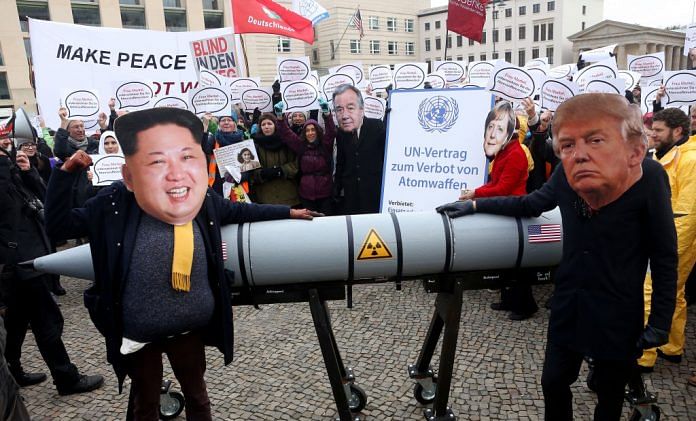If the nuclear crisis is resolved, all three countries should harmonise their strategies and work together. Viktor Orban’s party will most likely win once again in Hungary’s general election, giving his “illiberal democracy” a fourth term. Meanwhile, Ethiopia has a new prime minister, who is now the youngest and only Oromo prime minister in Ethiopia’s history.
United we should stand
In the South China Morning Post, Kristian McGuire writes that the only way to truly resolve the nuclear crisis is through a joint negotiation in which Beijing, Washington and Seoul are united, which cannot happen if each country is trying to sideline the other.
“Failure to properly prepare for such eventualities will put the three parties in weak negotiating positions vis-à-vis Pyongyang and greatly diminish the odds of reaching a lasting settlement to the issue,” writes McGuire. The US is pursuing a maximum pressure strategy that is risk-tolerant, while the Chinese strategy is risk-averse and limited in scope. South Korea is simply trying to bridge the gap between the two.
“Over the past few months, these three strategies have complemented one another, leading Pyongyang to assume a more cooperative posture,” McGuire concedes.
“The hard bargain that Pyongyang can be expected to drive will almost certainly attempt to exploit growing Sino-US rivalry, framing the Korean peninsula as the fulcrum on which US and Chinese influence in Northeast Asia is balanced. While it might be tempting for Washington and Beijing to try to reduce each other’s role in resolving the North Korean nuclear issue, it would be foolhardy to do so.”
“Ultimately, any lasting solution to the North Korean nuclear issue will require the support of South Korea, the US, and China. Were the US or China to somehow sideline the other in negotiations with North Korea and produce an agreement that does not take into account all parties’ security concerns, the resulting arrangement would only serve to increase Sino-US frictions over the long term.”
“By harmonising their North Korea strategies, the US, China and South Korea can send a message to Pyongyang that they won’t be played off against one another, regardless of what happens with these first engagement efforts. Only once Pyongyang becomes convinced of their resolve and unity of purpose do they stand a chance of achieving a permanent settlement to the North Korean nuclear issue,” writes McGuire.
The illiberal democracy
“On Sunday, Viktor Orban’s Fidesz party will likely cruise to another victory in Hungary’s general election, giving Mr. Orban, the reigning champion of “illiberal democracy” — a term he proudly embraces — a fourth term to pursue his assault on democratic institutions, immigrants, the European Union and anything smacking of social change,” the New York Times editorialises.
His party, Fidesz, “has actively pushed a narrative of Hungarian victimhood and ethnocentrism in schools, theaters and universities while vilifying any opposing viewpoint, and especially pro-democracy organizations funded by George Soros.”
“That illiberal democracy might find fertile ground in societies in profound transition, like those of Central Europe, is not so surprising. That a populist — or a populist cause like Brexit in Britain — can succeed in countries that are wealthy and seemingly stable suggests that deeply polarized societies are also vulnerable to extreme partisanship, and so to populist bombast. The great challenge for liberal democracy is to counter the populists without resorting to their tactics.”
“In the end, the legitimacy accorded by the vote is both the autocrat’s entree to power and potentially his (they are all men) downfall. Autocracy breeds corruption and cronyism, and leaders who wallow in the swamp they pledged to drain cannot forever fool their base. For all his evident popularity, Mr. Putin still felt compelled to block any effective opposition to his recent re-election; Mr. Erdogan’s speeches are beginning to bore some people; and however strong Mr. Orban’s chances appear, he has campaigned with an intensity that betrays a touch of insecurity.”
Ethiopia’s first Oromo leader
The ruling Ethiopian People’s Revolutionary Democratic Front (EPRDF) held a secret ballot last week to decide upon the new chairman of the coalition, who is also the prime minister. The party has had only two leaders in its three decades of existence.
“The result was also historic. Abiy Ahmed won the backing of 108 party bigwigs, while 59 went for Shiferaw Shigute, his closest rival. On April 2nd Mr Abiy was sworn in as prime minister, making the 42-year-old Africa’s youngest leader. He will also be the first in modern Ethiopian history to identify as Oromo—from the largest, and lately the most rebellious, of the country’s ethnic groups,” writes The Economist.
Oromia has been having anti-government protests for more than three years. “Anger over land seizures and government repression is compounded by a belief that other ethnic groups, such as the Amharas and Tigrayans, have for centuries conspired to keep Oromos out of power. The government reimposed a state of emergency in February after the resignation of the last prime minister, Hailemariam Desalegn. Mr Abiy’s rise has eased tensions, for now.”
“He takes office on a wave of goodwill. Taxis across Oromia are emblazoned with his photo. Activists abroad tweeted their support. Even in Addis Ababa, the capital, where locals are wary of his ethnic nationalism, there is optimism. In his inaugural speech Mr Abiy apologised for the government’s killing of protesters. He called for unity and talks with opposition groups. And he promised to make peace with Eritrea, Ethiopia’s long-standing enemy.”
“The appointment of Mr Abiy reflects a shift in the balance of power in the EPRDF. His Oromo People’s Democratic Organisation (OPDO) now takes the helm of the coalition.” Oromos make up over 30 per cent of Ethiopia’s population. Abiy will not have to reunite the EPRDF, and enact promised reforms.
Abiy is expected to “give a new life to the EPRDF”. “But revitalising the coalition will not necessarily lead to the democratic reforms demanded by activists. That may involve taking on the hardliners. Mr Abiy’s supporters are watching him closely.”



